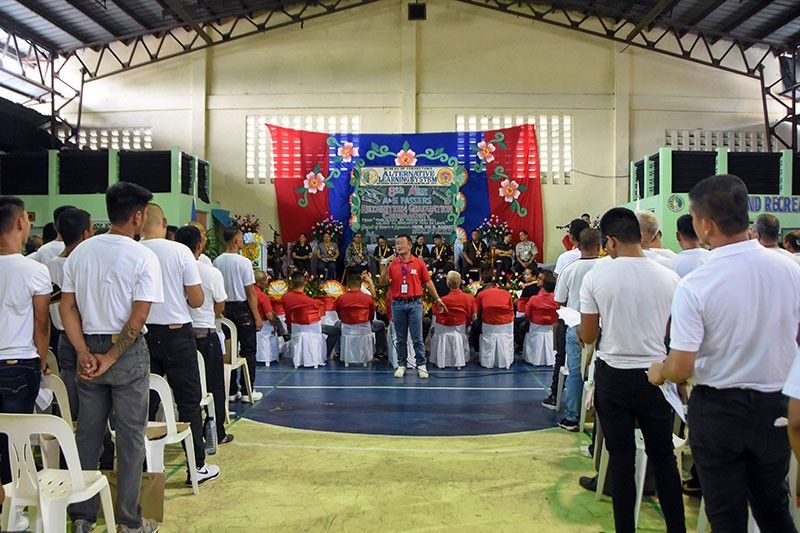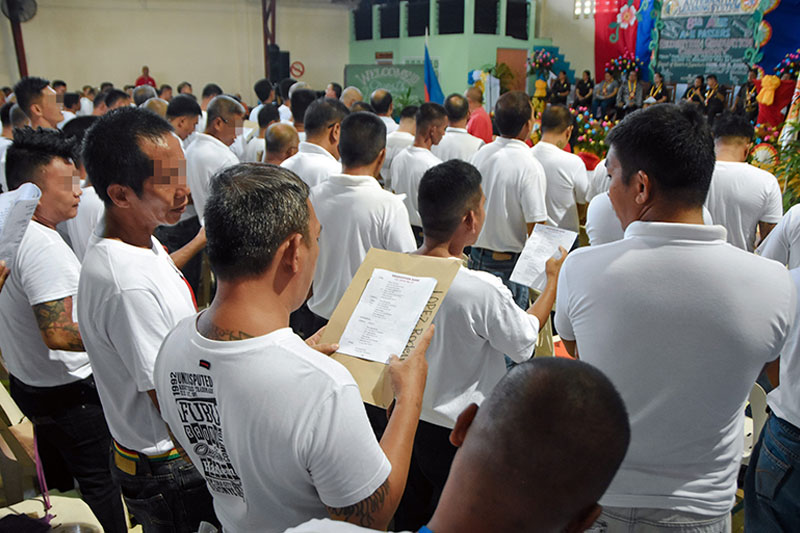Education behind bars

MANILA, Philippines — Punishment for crimes committed often go beyond the prison sentence. For many ex-convicts, securing a comfortable life after incarceration is as difficult as living behind bars.
It is one of the biggest challenges faced by ex-convicts, says New Bilibid Prison (NBP) training and education section chief Stella May Lat. In worst cases, she says, former prisoners find themselves once again on the wrong side of the law as they return to their old ways after getting their out-of-jail passes.
“This is what we want to address with our education program for inmates,” Lat says in a recent interview.
For over a decade now, inmates at the NBP in Muntinlupa City – including those at the maximum security compound or those sentenced to more than 20 years in jail – get the opportunity to enroll in various vocational courses that they can use when they start a new life.
For those who have not finished elementary and secondary education, the Department of Education (DepEd) also offers Alternative Learning System classes that will enable inmates to take equivalency tests.
56-year-old Fred (not his real name) admits that finding one’s purpose is not an easy task, especially for those detained at the maximum security compound.
With most inmates expecting to spend decades behind bars, thinking about what lies ahead is not on top of the minds of many of those incarcerated.
There were days, he says, when he just wanted to end his life.
Fred talks about spending countless of hours thinking about his family and those he left behind.

DepEd assistant secretary for ALS G.H. Ambat leads the ceremonies for Alternative Learning System graduates at the maximum security compound at the New Bilibid Prison (top). This year, 139 inmates at the NBP maximum security compound completed the ALS program and passed the accreditation and equivalency test (above). Photos courtesy of the Department of Education
Convicted of murder and sentenced to reclusion perpetua or up to 40 years in prison, the inmate says it took him some time before he was able to find, once again, his life’s purpose.
“I just want everything to be back to how it used to be,” he says in Filipino when asked what he looks forward to in the future. “I want my family to be complete. To have my own job when I am free.”
He says spiritual guidance eventually convinced him that his life isn’t over just yet.
Last year, after being detained for 17 years, he began thinking what would happen once he finished serving his term.
“We know that in a free world, it is difficult to find a job for those who came from the inside. This is why we want to study, especially technical education programs,” he adds.
The knowledge, he says, would enable ex-convicts to be productive members of society.
Last July, Fred, along with 138 other inmates at the maximum security compound, was recognized for completing the ALS and for passing the Accreditation and Equivalency (A&E) Test of the DepEd.
Fred, the class valedictorian, passed the A&E for junior high school and is now enrolled at a vocational program specializing in refrigeration and air conditioning.
Already an engineering graduate, he technically does not need to pass the A&E to enroll in the vocational course. In fact, he could even apply for a teaching post.
But with no available teaching slot and the deadline for signing up for vocational courses already over when he decided to join the education program, Fred says he requested that he be allowed to take part in the ALS.
“It is not acceptable that you would not do anything because there is no vacancy. That’s why I decided to enroll,” he says.
Not everyone, however, is as lucky as Fred, who was able to get proper education prior to being committed at the NBP.
Data showed that out of the almost 1,400 inmates currently enrolled in the ALS program at the maximum security compound, 101 are taking up basic literacy classes.
“That means they are no read, no write,” says DepEd Assistant Secretary for ALS G.H. Ambat. “They were not able to finish their education because of poverty. Most of them are from far-flung areas so you could imagine (their situation).”
Among those who had little education prior to being convicted is 37-year-old William (not his real name), who is serving a sentence of reclusion perpetua for the crime of rape.
Now in prison for 18 years, he says he only finished Grade 5, citing financial difficulties and the distance of travel required to get to school.
“I just want to finish education,” he says after getting recognized for passing the A&E for elementary level. “This is very important for us because we can use what we have learned.”
William says he intends to continue studying so he can enroll in a vocational course in the future.
The ALS is the flagship education program of DepEd under Secretary Leonor Briones.
It enables out-of-school youth and adults who did not finish basic education, such as those in prisons, to develop basic functional literacy skills and provide opportunities complete basic education levels without going through regular classes.
ALS learners also have the option to take an accreditation and equivalency certification that will allow them to continue their education in the formal system.
Since her assumption in 2016, Briones has pushed for a stronger implementation of the ALS program, stressing the need to reach millions of those left behind.
Earlier this year, the department started implementing an enhanced ALS curriculum in line with the K-12 program.
According to DepEd, the new ALS curriculum, while not a mirror image of the formal school curriculum, is substantially aligned with the competencies of the K-12 system.
It covers information and communications technology and life and career skills, as well as competencies not included in formal curricula that aim to provide support to the specific needs of the learners such as applications of competencies in everyday life.
While it has five key stages, only four are currently being implemented – basic literacy, lower elementary, advanced elementary and junior high school.
The ALS senior high school curriculum, according to the DepEd official, is currently under development.
Both Ambat and Lat stress the importance of education in the reformation of inmates. The corrections officer says many of those who have finished serving their sentences were still able to succeed in life because of the new craft that they have learned while incarcerated.
“There were those who would later inform us that they are already working, that they have succeeded after leaving,” Lat adds in Filipino.
She admits, however, that many of the inmates who take part in the education programs initially do it for the good conduct time allowance that would be deducted from their prison sentence.
But eventually, she says, they realize the importance of the knowledge that they would learn through the program.
38-year-old Michael (not his real name), who is serving a sentence for murder and frustrated murder, says education has given him hope for the future.
“Outside, I was not able to finish anything. I am happy and I think my friends would really be proud of me,” he says after passing the A&E for junior high school. “At least something changed in my life.”
Michael says he understands that life will not be the same once he finishes serving his sentence, noting that he has not heard from his wife and children for years. But with enough knowledge to start over, he expresses hope that he would still be able to live a fulfilling life.
“If I would have a choice, I just want to live alone. Maybe see my child once in a while, ask for forgiveness,” he says. “If I get the chance to get out again, I will have a difficulty finding a job. But with what I have learned – repair radios, refrigerators and air conditioners – maybe even at home I can set up shop and use the skills that I have learned.”
Faces of the inmates were blurred and their identites hidden as per guidelines of the Bureau of Corrections.
- Latest
- Trending


















